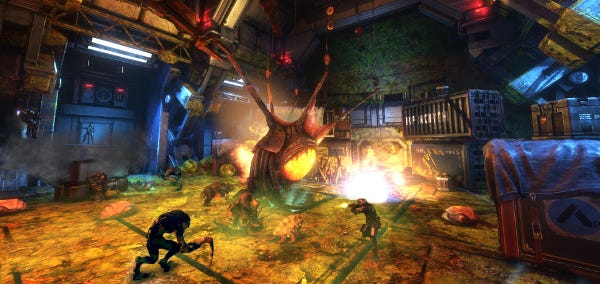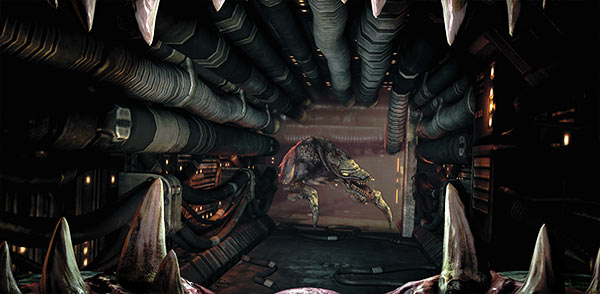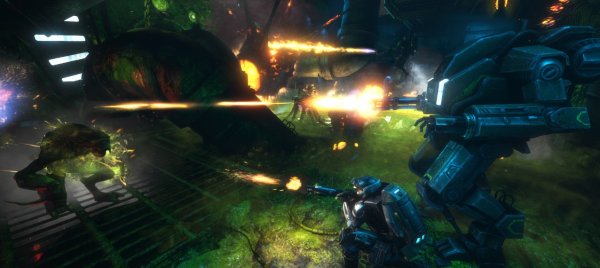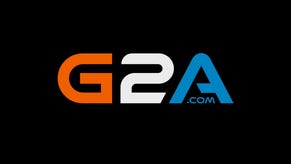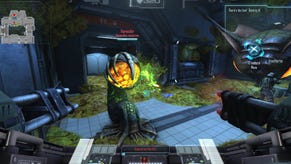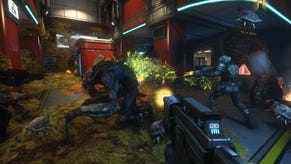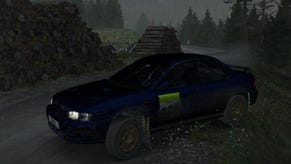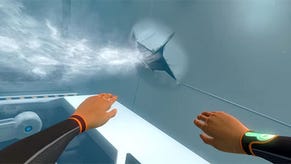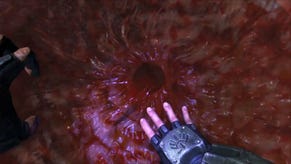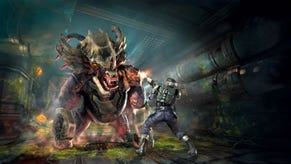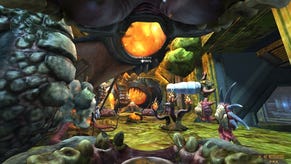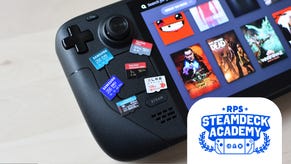How Natural Selection 2 Was Saved (And Made) By Fans
Of Close Calls And Crazy People
Natural Selection 2 is out. You can buy it right now. Given that it's actually possible both purchase and play (!) a great many games, that might not seem like such a huge deal to you. But make no mistake: Unknown Worlds' RTS/FPS buildy-chompy-shooty hybrid could've easily died on the vine. And it nearly did - over and over and over, for pretty much the entirety of its development cycle. Fortunately, the NS2 team has always had a secret weapon on its side: a community that is - by most definitions of the word - completely and rather terrifyingly insane. This is their story.
Life isn't fair. Things rarely - if ever - go the way we plan them. But most of the time, that usually just means canceling vacation plans or tearfully imagining countless XCOM squadmates floating out to the ocean in their fiery Viking coffins. For Natural Selection 2 game director Charlie Cleveland, however, the flippant whims of fate nearly stole away his dream project. Countless times.
"It went to hell as soon as NS2 started," Cleveland says bluntly, laughing. "NS1, there was no funding required, and no big team. Making a Half-Life 1 mod is totally different from making [a full game]. I mean, game design-wise it's basically like making a game today. But technically, artistically, for all the environments, it is such a different game. Business model, all that stuff. People expect a lot more. They need nice animations and nice particle effects and all that stuff. It makes the whole budget ripple. And it can't be done by one person. So the funding... it pretty much went straight to hell."
"It was always a struggle," adds art director and project long-timer Cory Strader. "There was never enough of that initial chunk of money to really get rolling. We could never hire enough. We could never do the things we needed to do. We were always on the brink of going out of business. We'd get paid, then we'd have to come up with some new scheme to generate a bit more money."
It's almost too fitting, then, that we're sitting in a break room littered with slabs of wood from Unknown Worlds' PAX booth. Each is dotted with signatures from diehard fans - Natural Selection 2's saviors, whether from halfway across the world, within that very office building, or sometimes, both. They crowdfunded NS2 before crowdfunding was even a word. They contributed whole maps and entire systems to the final game. They believed it'd eventually be good, even when it definitely wasn't. And so, naturally, Cleveland and co plan to have the planks topped with glass and turned into a table, a constant reminder of the absurdly passionate folks who kept them afloat. Which isn't really what tables do, but you get the idea.
The Natural Selection community's always been a bit more dedicated than most, Strader points out. "Maybe that's it," he motions, glancing up from a moment of silent contemplation. "Just the kind of people that you're going to attract that are looking for something different. They clearly are a minority, when 24 million people are buying Call of Duty. The kind of people who play Natural Selection are obviously a much smaller group, but maybe they're a much more passionate, loyal fanbase."
Strader's not just puffing out his chest for promotion's sake, either. He and the rest of the team at Unknown Worlds know that their fans are, well, kind of insane. They know because even their most rabidly dedicated followers have been put to the test. It all began with an alpha that - in all honesty - was "alpha" in name more than anything else.
"We just... We felt like we had to call it 'alpha' because we needed the press," Cleveland reflects. "We needed people to get excited about something and actually play it and maybe drive pre-orders. We probably could have called it a 'development build,' now that I look back on it. That might have worked. People were just expecting something more. They legitimately deserved to get more, but we didn't have any more. We had to release something, because we needed the influx of money from new pre-orders."
Unfortunately, that didn't save the day. Not by a long shot.
"It got us through," Cleveland sighs. "I forget how much time that bought us. Three months, four months. Beta was shortly thereafter. It was one of the lowest points. We really needed money from beta. Or 'beta' I guess. We had this awesome trailer. And for some reason, we did not get picked up anywhere. We had no sales."
"That was the low point in our community, too," adds Strader. "They were along for the ride with us for alpha. They knew it was buggy and all that stuff. People were saying, 'It's not ready for [beta] at all! This is ridiculous!' It was a little challenging to go through that point. It was just so much constant negativity from every direction."
"But there was just no way we could have avoided it. From the beginning, that was a goal of ours: to be as open with our community as possible. We've worked at other game companies - I've been at three other companies now - and everything is always so secretive. You always have a publisher that dictates the PR that you can do, when you can do it, when you can release screenshots and all that stuff. It's so freeing to not have those constraints - to be like, 'Hey, guys, this is what game development is really like.' But it comes with all these problems. They still don't understand how much real thought and time goes into things. It's not pretty. When you're working at a game company, you have all these problems that people just don't see."
Keeping development more open than most, however, produced an interesting effect. While some fans picked up their techno-pitchforks and space-torches (burning with that magical spaceship sci-fire that survives in the vacuum of space), others slipped on their programming gloves and got to work. Put simply, dedicated community members thought they could do better than Unknown Worlds. So they did.
"Our spectator system comes from this guy who works at Amazon who decided he wanted to make a better spectator system than we had," Cleveland grins. "He just did it. We were like, 'That's amazing. Can you add some more and can we put it in the game?' He says, 'Of course, what do you want?'"
"And then Andreas, this Austrian guy, he was fixing some bugs. He was doing crazy work with features. So we said, 'Hey, that's pretty cool. Can we incorporate that in the game?' All this with a YouTube video. 'New Gorge ability!' It was really weird, but kind of cool - like, how did he do that? Now he's here. Hopefully he'll be here permanently at some point, but for now he's just here for two months to help us finish the game. We are paying him. He didn't graduate from college. He's never worked on a game. But he's an amazing gameplay programmer. You could not find this person if you tried. If you looked at his resume you'd never pick him up. But there he is."
Meanwhile, all this time, Unknown Worlds' main PR man, Hugh Jeremy, has been popping in and out of the room - occasionally adding tidbits to the conversation, but mostly running himself ragged in the crunch to make sure Natural Selection 2's ready for launch. And while you could trace his most recent footsteps to a billion different places in the office, they began - if we're getting technical - in Australia.
"He made 300 videos for NS2," Cleveland says, still slightly in disbelief himself. "We weren't promoting the game at all. He started NS2HD, a channel on YouTube. He was just posting a video every day, or every other day. He did better videos than we could ever have done. When our investors were like, 'We don't know if we believe that you can pull this off, we're starting to lose faith,' and our beta pre-sales were horrible, all of a sudden they could go to NS2HD. We could send them a video and say, "Hey, check out the game." Little do they know that Hugh was amazing at making videos, and somehow avoided all the bugs. It made the game look better than it ever looked. We could send that to our investors and say, 'Hey, look, we're going to do this. Check it out.' Now he's here doing PR for us."
It wasn't a simple hop, skip, and jump for Jeremy either. He goes on to tell me that he abandoned his home, girlfriend, and stable job in Australia for the chance to move across the world and have a go at getting Natural Selection 2 out the door. And the craziest part? He still continues to make videos in his spare time.
Others, meanwhile, are churning away on Natural Selection 2 without ever having set foot in the San-Francisco-based office at all. "We have no mappers here," says Cleveland. "There's not one mapper in the building."
"They're mostly in the UK," Strader points out, noting that two of the release version's six maps wouldn't even exist without community contributions - both from contractors and regular old modders. "Like one map, Vale, it had a lot of promise, so we brought it on board. But we did work on it. I did concepts for it. Our environment artist did all-new models and textures and landmark props, which made it so much more. It was using all the same existing assets that every single other mapper was using, so it was nice to give it a whole new coat of paint. So even though these maps came from the community, we worked closely once we brought them on board and made them official."
Admittedly, it's not wholly uncommon to see developers latch onto modders' maps and polish them up for a wider release (Valve's an especially big example), but entire systems and features - not to mention key employees and the whole QA testing staff - are another story altogether. It sort of makes sense in a full-circle type of way, though, seeing as the original Natural Selection wouldn't exist at all if it weren't for the Half-Life modding community.
"That's where game ideas come from, too: mods," Cleveland lights up. "I used to think that you had to study games to understand how to make games, and you really don't. You can have an idea and try it and see how it goes. You can get a pretty quick feel for how well something's going to work just by playing it. So anything you can do to just encourage people to try something and then evaluate it with an open mind - see what they think. Are they playing it again? Are they talking about it? Are they interested in tweaking it? Or is it just kinda limp on arrival? Maybe people in our community saw NS1 as being an achievement in modding, so they say, 'Well, if he can do that, I can do this.' It's a good example for them, I think, to just get involved."
"We get a lot of tweets, we get e-mails, forum posts," Strader smiles. "People say that they were inspired to [make games]. They're going to Full Sail for game development or trying to start their own project up or doing a mod or something, and they say Natural Selection was their inspiration. It's pretty cool."
But let's be honest here: there are hundreds of thousands of mods out there, and Natural Selection's hardly the first one to become a full game. So why has it resonated with so many aspiring developers? Jeremy cites leadership - both in terms of leading and being led. "In games, you can be an architect, a soldier, land on the moon - all these experiences you'd never be able to have," he explains. "Natural Selection amazed me because of this commander-human interaction. It's not something you get in other games. StarCraft II, for instance, is about directing machines. It's amazing, don't get me wrong, but if you tell a marine to attack an enemy base all alone in NS2, they'll be like, 'Mate, no, I'm gonna get killed.' And you have to say, 'Look, I know it's gonna be tough, but I'm gonna supply you with medpacks, and you need to do this for the team.'"
Other members of the dev team, meanwhile, cite the chance to work on something that really affected them when they were kids, or simply a sense of kinship with the NS2 team. The responses run a wide spectrum, but the passion's always palpable. And these people are in the middle of a brutal crunch. Maybe it's simply because they're so close to the finish line, but I'm blindsided by the lack of cynicism.
Perhaps, in part, it's also a matter of attitude. Game development - despite what some might think - isn't an easy job. It's a mentally and - if you're not careful - physically taxing lifestyle that produces countless washouts. But even back when things seemed so hilariously bleak that, these days, Cleveland simply has to laugh when he talks about them, the Natural Selection team never stopped believing in their project. In their minds, there was no worse outcome than abandoning the thing they loved.
"It would just be so humiliating to close the company and go work for Zynga," Cleveland replies when I ask him what kept the team going. "I remember one year I was at GDC, and everyone commented on how depressed I looked. Everyone was like, 'What is wrong?' I think it was 2005. I was probably thinking, 'I'm gonna have to go work for some other company that I don't like. I give up. Bye-bye dream, throw it in the garbage.'"
"That, to me, is so much worse than toughing it out and figuring out a way. We took the easy route, when you look at it like that."
And it worked. Seven years later - and more than a decade after Cleveland first started Natural Selection as a one-man show - it's a (mostly) full realization of his original vision, available wherever these crazy personal computer gametapes we all love so much are sold. But even when you're doing something for the love of it, these things have a way of taking their toll. Cleveland and Strader fully acknowledge that, but they're not ready to leave Natural Selection entirely in the community's hands just yet.
"There's so much more that we want to do with it," enthuses Strader. "On the one hand you want to try something different, but on the other hand, you want to take this and keep making it bigger and better and crazier."
"We'll keep working on it for quite a while," Cleveland adds with a slightly wearied note to his voice. "We might do some other projects too. I'd like to get to the point where we're putting out new games rapidly, without such an extended development. Anything we can do to make that happen would be great. I have so many ideas for games that I want to make that have nothing to do with NS. I don't know when that's going to happen, if not now."
"But on the other hand, it's been pretty awesome. It'd be nice to try something new, but I still love this universe. I love this game concept."
